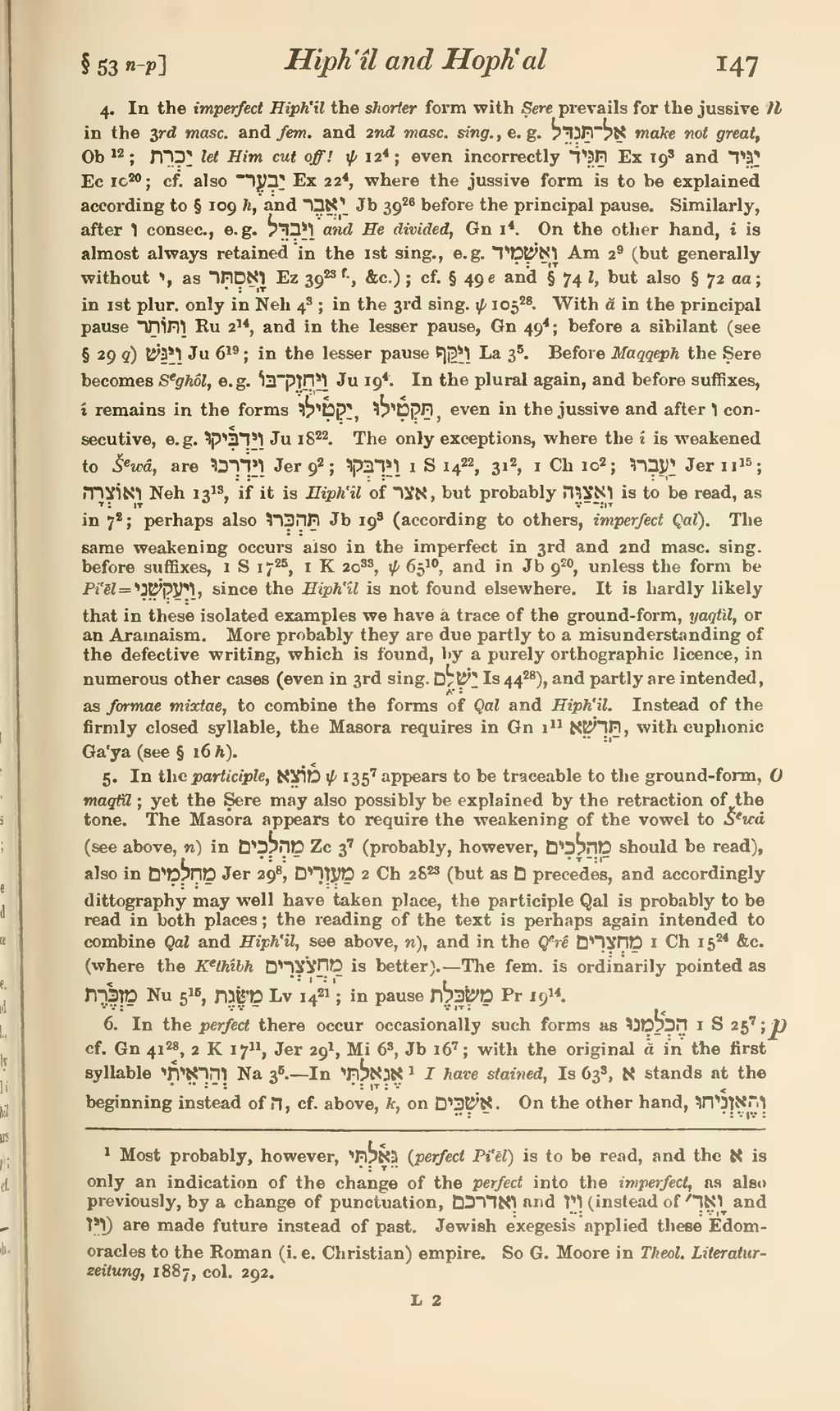[n] 4. In the imperfect Hiphʿîl the shorter form with Ṣere prevails for the jussive in the 3rd masc. and fem. and 2nd masc. sing., e.g. אַל־תַּגְדֵּל make not great, Ob 121; יַכְרֵת let Him cut off! ψ 12; even incorrectly תַּגֵּיד Ex 19 and יַגֵּיד Ec 10; cf. also יַבְעֶר־ Ex 22, where the jussive form is to be explained according to § 109 h, and יַֽאֲבֶר Jb 39 before the principal pause. Similarly, after ו consec., e.g. וַיַּבְדֵּל and He divided, Gn 1. On the other hand, î is almost always retained in the 1st sing., e.g. וָאַֽשְׁמִיד Am 2 (but generally without י, as וָאַֽסְתִּר Ez 39 f., &c.); cf. § 49 e and § 74 l, but also § 72 aa; in 1st plur. only in Neh 4; in the 3rd sing. ψ 105. With ă in the principal pause וַתּוֹתַר Ru 2, and in the lesser pause, Gn 49; before a sibilant (see § 29 q) וַיַּגַּשׁ Ju 6; in the lesser pause וַיַּקַּף La 3. Before Maqqeph the Ṣere becomes Seghôl, e.g. וַיַּֽחֲזֶק־בּוֹ Ju 19. In the plural again, and before suffixes, î remains in the forms יַקְטִ֫ילוּ, תַּקְטִ֫ילוּ, even in the jussive and after ו consecutive, e.g. וַיַּדְבִּ֫יקוּ Ju 18. The only exceptions, where the î is weakened to Šewâ, are וַיַּדְרְכוּ Jer 9; וַיַּדְבְּקוּ 1 S 14, 31, 1 Ch 10; יַֽעַבְרוּ Jer 11; וָֽאוֹצְרָה Neh 13, if it is Hiphʿîl of אצר, but probably וָֽאֲצַוֶּה is to be read, as in 7; perhaps also תַּהְכְּרוּ Jb 19 (according to others, imperfect Qal). The same weakening occurs also in the imperfect in 3rd and masc. sing. before suffixes, 1 S 17, 1 K 20, ψ 65, and in Jb 9, unless the form be Piʿēl=וַיְעַקְשֵׁנִי, since the Hiphʿîl is not found elsewhere. It is hardly likely that in these isolated examples we have a trace of the ground-form, yaqtĭl, or an Aramaism. More probably they are due partly to a misunderstanding of the defective writing, which is found, by a purely orthographic licence, in numerous other cases (even in 3rd sing. יַשְׁלִ֑ם Is 44), and partly are intended, as formae mixtae, to combine the forms of Qal and Hiphʿîl. Instead of the firmly closed syllable, the Masora requires in Gn 1 תַּֽדְשֵׁא, with euphonic Ga‛ya (see § 16 h).
[o] 5. In the participle, מ֫וֹצֵא ψ 135 appears to be traceable to the ground-form, maqtĭl; yet the Ṣere may also possibly be explained by the retraction of the tone. The Masora appears to require the weakening of the vowel to Šewâ (see above, n) in מַהְלְכִים Zc 3 (probably, however, מַֽהֲלָכִים should be read), also in מַחְלְמִים Jer 29, מַעְזְרִים 2 Ch 28 (but as ם precedes, and accordingly dittography may well have taken place, the participle Qal is probably to be read in both places; the reading of the text is perhaps again intended to combine Qal and Hiphʿîl, see above, n), and in the Qerê מַחְצְרִים 1 Ch 15 &c. (where the Kethîbh מַֽחֲצֹֽצְרִים is better).—The fem. is ordinarily pointed as מַזְכֶּ֫רֶת Nu 5, מַשֶּׂגֶת Lv 14; in pause מַשְׂכָּֽלֶת Pr 19.
[p] 6. In the perfect there occur occasionally such forms as הֶכְלַ֫מְנוּ 1 S 25; cf. Gn 41, 2 K 17, Jer 29, Mi 6, Jb 16; with the original ă in the first syllable וְהַרְאֵיתִ֫י Na 3.—In אֶגְאָֽלְתִּי[1] I have stained, Is 63, א stands at the beginning instead of ה, cf. above, k, on אַשְׁכֵּים. On the other hand, וְהֶֽאֶזְנִ֫יחוּ
- ↑ Most probably, however, גֵּאָ֫לְתִּי (perfect Piʿēl) is to be read, and the א is only an indication of the change of the perfect into the imperfect, as also previously, by a change of punctuation, וְאדרכם and וְיֵז (instead of וָֽאֶדְ׳ and וָיֵּז) are made future instead of past. Jewish exegesis applied these Edomoracles to the Roman (i.e. Christian) empire. So G. Moore in Theol. Literaturzeitung, 1887, col. 292.
